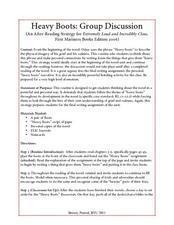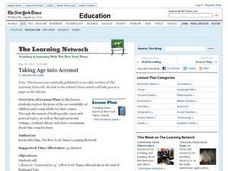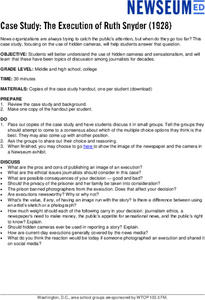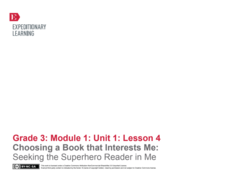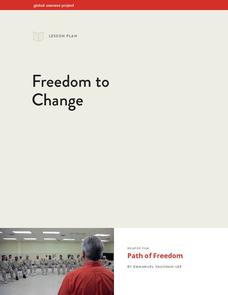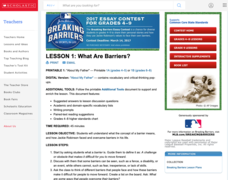EngageNY
Mid-Unit 3 Assessments, Part 2: Summarizing, Analyzing and Discussing Research
Why is reading important? As part of the mid-unit assessment, scholars read, summarize, and analyze an article about the importance of reading. Additionally, they continue their discussion about whether their rules to live by should be a...
Curated OER
Creating Classroom Rules
Perfect for establishing classroom protocols, this activity gets even the youngest learners thinking about rules and their consequences. The lesson begins with a discussion and a reading of the poem Humpty Dumpty that gets youngsters...
Curated OER
Don't Believe the Type: Internet Ethics
What is Internet fraud? Explore Internet ethics and engage in a collaborative discussion. In order to create a Guide to Internet Honesty, learners read and discuss the article "A Beautiful Life, A Tragic Death, a Fraud Exposed." Then...
EngageNY
Mid-Unit Assessment: Small Group Discussion: How Do Modern Poems Portray Modern Adversities?
How is a poem similar to and different from a news article? Pupils use a graphic organizer to compare and contrast the two genres. Also, as part of a mid-unit assessment, scholars participate in small-group discussions based on poetry...
Curated OER
Heavy Boots: Group Discussion
Jonathan Safran Foer's phrase, "heavy boots," becomes the focus of a class discussion of grief and sadness. During the reading of Extremely Loud and Incredibly Close, individuals place examples of their own experiences with these topics...
Macmillan Education
Understanding Your Skills and Talents
Skills, talents, and personal qualities are the focus of the fourth session in a 23-lesson series of life skills exercises. Participants build a mind map of all the skills and talents in the class, and then groups work together to...
Ford's Theatre
Socratic Seminar/Group Discussion: The Crisis of the Civil War
High schoolers work in four different groups to examine the many factors that led to the American Civil War. They research an assigned topic, prepare questions, and finally engage in a class discussion using the Socratic Seminar method.
Curated OER
Taking Age into Account
Have your class consider the issue of minors' accountability for their crimes. They discuss specific cases and the general issue of juvenile crime in round table discussions. Use this lesson to emphasize the rules and individual roles...
Curated OER
Laughing Matters
Is laughter really the best medicine? Middle and high schoolers discuss the truth behind this adage by reading and discussing a New York Times article about Dr. Patch Adams. They participate in a round-table debate in response to...
Curated OER
Homophobia: What is It? What Can We Do About It?
A two-part instructional activity focuses on the sensitive issues of homophobia, discrimination, sexuality, and gender. Middle schoolers discuss individual and institutional discrimination, personal rights, homosexuality, and bullying.
Constitutional Rights Foundation
Special Order 40
The city of Los Angeles' 1979 Special Order 40 states: "LAPD officers shall not initiate police action with the objective of discovering the alien status of a person." After reading a fact sheet that details the history of Special Order...
Nemours KidsHealth
Stress: Grades 9-12
Everyone feels stress from time to time, but how can you move past it? A seven-page packet of activities guides high schoolers through the process of recognizing and managing their stress. The resource includes discussion topics, a quick...
Robert Frost Farm
Socratic Seminar Format Overview
Whether new to the Socratic seminar format or an experienced veteran of the popular discussion technique, you'll find much to like in a five-page, richly detailed packet that not only details the prep necessary, the process, and the...
Curated OER
Discussion Web: Ender's Game
Designed to encourage readers to consider both sides of of the question of whether Ender is responsible for the death of all the buggers, individuals search for examples from Orson Scott Card's popular science fiction novel, Ender's Game...
EngageNY
Reading about the Author’s Perspective: Why Do Authors Write about Natural Disasters?
It's all about perspective. Scholars view a note from the author in Eight Days. They determine the gist and discuss what they can learn about the author's background based on the note. They then complete a fishbowl activity in which they...
EngageNY
Using Multiple Resources of Information: Creating a Cascading Consequences Chart about DDT and Practicing a Fishbowl Discussion
For every action there is a consequence. Scholars continue their work on creating a cascading consequence chart about DDT using Welcome Back, The Exterminator, Rachel Carson: Sounding the Alarm on Pollution along with graphic organizers...
Learning Seed
The Art of Listening
Conversation isn't just about talking. Help you class work on the important conversational skills with a lesson plan about listening. As youngsters practice making statements and asking attentive questions, they reflect on the way they...
Newseum
Case Study: The Execution of Ruth Snyder (1928)
The case of the 1928 execution of Ruth Snyder takes center stage in a lesson that asks young journalists to consider the ethics involved in publishing an image of an execution. A series of discussion questions ask individuals how they...
EngageNY
Choosing a Book That Interests Me: Seeking the Superhero Reader in Me
Selecting a "power book" and engaging in a structured class discussion are the learning targets for this fourth lesson in a larger unit. It is designed as a beginning of the year unit for establishing norms and routines in the classroom....
Global Oneness Project
Freedom to Change
Here's something unusual and thoughtful: have your scholars do some pensive reflection themselves before tackling how such meditative techniques are used in prison rehabilitation programs. They watch the "Path of Freedom" video found...
Constitutional Rights Foundation
Refugees from the Caribbean: Cuban and Haitian “Boat People”
Should refugees fleeing poverty be allowed the same entrance into the United States as those fleeing persecution? High schoolers read about US foreign policy in the late 20th century regarding refugees from Cuba and Haiti, and engage in...
EngageNY
Group Discussions and Revision: Editorial Essay
Great minds think aloud! Pupils participate in the Fishbowl protocol, discussing their opinions about the Mary River mine proposal. As they share their thoughts, peers provide feedback about their thesis and supporting ideas.
Scholastic
Lesson 1: What Are Barriers?
Scholars discuss the concept of a barrier with a short passage on Jackie Robinson. The writing process begins with a paragraph and several other sentences about Robinson's unique traits that made breaking a barrier possible.
EngageNY
Mid-Unit 3 Assessment, Part 2: Explaining How New Information Connects to the Topic
Let's talk it out. Using the resource, scholars work in triads to discuss how their research has deepened their understanding about sustainable fishing. Next, pupils engage in a whole-class discussion to consider their next steps toward...
Other popular searches
- Book Discussion Groups
- Literature Discussion Groups
- On Line Discussion Groups
- Online Discussion Groups
- Novel Discussion Groups
- Threaded Discussion Groups






